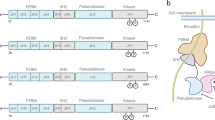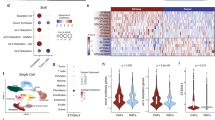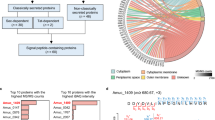Abstract
The mucin 1 (MUC1) oncoprotein has been linked to the inflammatory response by promoting cytokine-mediated activation of the NF-κB pathway. The TGF-β-activated kinase 1 (TAK1) is an essential effector of proinflammatory NF-κB signaling that also regulates cancer cell survival. The present studies demonstrate that the MUC1-C transmembrane subunit induces TAK1 expression in colon cancer cells. MUC1 also induces TAK1 in a MUC1+/−/IL-10−/− mouse model of colitis and colon tumorigenesis. We show that MUC1-C promotes NF-κB-mediated activation of TAK1 transcription and, in a positive regulatory loop, MUC1-C contributes to TAK1-induced NF-κB signaling. In this way, MUC1-C binds directly to TAK1 and confers the association of TAK1 with TRAF6, which is necessary for TAK1-mediated activation of NF-κB. Targeting MUC1-C thus suppresses the TAK1→NF-κB pathway, downregulates BCL-XL and in turn sensitizes colon cancer cells to MEK inhibition. Analysis of colon cancer databases further indicates that MUC1, TAK1 and TRAF6 are upregulated in tumors associated with decreased survival and that MUC1-C-induced gene expression patterns predict poor outcomes in patients. These results support a model in which MUC1-C-induced TAK1→NF-κB signaling contributes to intestinal inflammation and colon cancer progression.
This is a preview of subscription content, access via your institution
Access options
Subscribe to this journal
Receive 50 print issues and online access
$259.00 per year
only $5.18 per issue
Buy this article
- Purchase on Springer Link
- Instant access to full article PDF
Prices may be subject to local taxes which are calculated during checkout







Similar content being viewed by others
References
Kufe D . Mucins in cancer: function, prognosis and therapy. Nat Rev Cancer 2009; 9: 874–885.
Byrd JC, Bresalier RS . Mucins and mucin binding proteins in colorectal cancer. Cancer Metastasis Rev 2004; 23: 77–99.
Suzuki H, Shoda J, Kawamoto T, Shinozaki E, Miyahara N, Hotta S et al. Expression of MUC1 recognized by monoclonal antibody MY.1E12 is a useful biomarker for tumor aggressiveness of advanced colon carcinoma. Clin Exp Metastasissis 2004; 21: 321–329.
Niv Y . MUC1 and colorectal cancer pathophysiology considerations. World J Gastroenterol 2008; 14: 2139–2141.
Lugli A, Zlobec I, Baker K, Minoo P, Tornillo L, Terracciano L et al. Prognostic significance of mucins in colorectal cancer with different DNA mismatch-repair status. J Clin Pathol 2007; 60: 534–539.
Nakamori S, Ota DM, Cleary KR, Shirotani K, Irimura T . MUC1 mucin expression as a marker of progression and metastasis of human colorectal carcinoma. Gastroenterology 1994; 106: 353–361.
Baldus SE, Monig SP, Hanisch FG, Zirbes TK, Flucke U, Oelert S et al. Comparative evaluation of the prognostic value of MUC1, MUC2, sialyl-Lewis(a) and sialyl-Lewis(x) antigens in colorectal adenocarcinoma. Histopathology 2002; 40: 440–449.
Duncan TJ, Watson NF, Al-Attar AH, Scholefield JH, Durrant LG . The role of MUC1 and MUC3 in the biology and prognosis of colorectal cancer. World J Surg Oncol 2007; 5: 31.
Fearon ER . Molecular genetics of colorectal cancer. Annu Rev Pathol 2011; 6: 479–507.
Huang L, Chen D, Liu D, Yin L, Kharbanda S, Kufe D . MUC1 oncoprotein blocks GSK3β-mediated phosphorylation and degradation of β-catenin. Cancer Res 2005; 65: 10413–10422.
Rajabi H, Ahmad R, Jin C, Kosugi M, Alam M, Joshi M et al. MUC1-C oncoprotein induces TCF7L2 activation and promotes cyclin D1 expression in human breast cancer cells. J Biol Chem 2012; 287: 10703–10713.
Ahmad R, Raina D, Joshi MD, Kawano T, Kharbanda S, Kufe D . MUC1-C oncoprotein functions as a direct activator of the NF-κB p65 transcription factor. Cancer Res 2009; 69: 7013–7021.
Li Y, Liu D, Chen D, Kharbanda S, Kufe D . Human DF3/MUC1 carcinoma-associated protein functions as an oncogene. Oncogene 2003; 22: 6107–6110.
Raina D, Kharbanda S, Kufe D . The MUC1 oncoprotein activates the anti-apoptotic PI3K/Akt and Bcl-xL pathways in rat 3Y1 fibroblasts. J Biol Chem 2004; 279: 20607–20612.
Ahmad R, Raina D, Trivedi V, Ren J, Rajabi H, Kharbanda S et al. MUC1 oncoprotein activates the IκB kinase β complex and constitutive NF-κB signaling. Nat Cell Biol 2007; 9: 1419–1427.
Rajabi H, Alam M, Takahashi H, Kharbanda A, Guha M, Ahmad R et al. MUC1-C oncoprotein activates the ZEB1/miR-200c regulatory loop and epithelial-mesenchymal transition. Oncogene 2013; 33: 1680–1689.
Sakurai H . Targeting of TAK1 in inflammatory disorders and cancer. Trends Pharmacol Sci 2012; 33: 522–530.
Ajibade AA, Wang HY, Wang RF . Cell type-specific function of TAK1 in innate immune signaling. Trends Immunol 2013; 34: 307–316.
Omori E, Matsumoto K, Zhu S, Smart RC, Ninomiya-Tsuji J . Ablation of TAK1 upregulates reactive oxygen species and selectively kills tumor cells. Cancer Res 2010; 70: 8417–8425.
Ray DM, Myers PH, Painter JT, Hoenerhoff MJ, Olden K, Roberts JD . Inhibition of transforming growth factor-beta-activated kinase-1 blocks cancer cell adhesion, invasion, and metastasis. Br J Cancer 2012; 107: 129–136.
Singh A, Sweeney MF, Yu M, Burger A, Greninger P, Benes C et al. TAK1 inhibition promotes apoptosis in KRAS-dependent colon cancers. Cell 2012; 148: 639–650.
Mihaly SR, Ninomiya-Tsuji J, Morioka S . TAK1 control of cell death. Cell Death Differ 2014; 21: 1667–1676.
Relic B, Benoit V, Franchimont N, Ribbens C, Kaiser MJ, Gillet P et al. 15-deoxy-delta12,14-prostaglandin J2 inhibits Bay 11-7085-induced sustained extracellular signal-regulated kinase phosphorylation and apoptosis in human articular chondrocytes and synovial fibroblasts. J Biol Chem 2004; 279: 22399–22403.
Wang C, Deng L, Hong M, Akkaraju GR, Inoue J, Chen ZJ . TAK1 is a ubiquitin-dependent kinase of MKK and IKK. Nature 2001; 412: 346–351.
Takaesu G, Surabhi RM, Park KJ, Ninomiya-Tsuji J, Matsumoto K, Gaynor RB . TAK1 is critical for IkappaB kinase-mediated activation of the NF-kappaB pathway. J Mol Biol 2003; 326: 105–115.
Yamazaki K, Gohda J, Kanayama A, Miyamoto Y, Sakurai H, Yamamoto M et al. Two mechanistically and temporally distinct NF-kappaB activation pathways in IL-1 signaling. Sci Signal 2009; 2: ra66.
Starczynowski DT, Lockwood WW, Delehouzee S, Chari R, Wegrzyn J, Fuller M et al. TRAF6 is an amplified oncogene bridging the RAS and NF-kappaB pathways in human lung cancer. J Clin Invest 2011; 121: 4095–4105.
Raina D, Ahmad R, Rajabi H, Panchamoorthy G, Kharbanda S, Kufe D . Targeting cysteine-mediated dimerization of the MUC1-C oncoprotein in human cancer cells. Int J Oncol 2012; 40: 1643–1649.
Corcoran RB, Cheng KA, Hata AN, Faber AC, Ebi H, Coffee EM et al. Synthetic lethal interaction of combined BCL-XL and MEK inhibition promotes tumor regressions in KRAS mutant cancer models. Cancer Cell 2013; 23: 121–128.
Ullman TA, Itzkowitz SH . Intestinal inflammation and cancer. Gastroenterology 2011; 140: 1807–1816.
Campbell BJ, Yu LG, Rhodes JM . Altered glycosylation in inflammatory bowel disease: a possible role in cancer development. Glycoconj J 2001; 18: 851–858.
Rhodes JM . Unifying hypothesis for inflammatory bowel disease and associated colon cancer: sticking the pieces together with sugar. Lancet 1996; 347: 40–44.
Furr AE, Ranganathan S, Finn OJ . Aberrant expression of MUC1 mucin in pediatric inflammatory bowel disease. Pediatr Dev Pathol 2010; 13: 24–31.
Rowse GJ, Tempero RM, VanLith ML, Hollingsworth MA, Gendler SJ . Tolerance and immunity to MUC1 in a human MUC1 transgenic murine model. Cancer Res 1998; 58: 315–321.
Berg DJ, Davidson N, Kuhn R, Muller W, Menon S, Holland G et al. Enterocolitis and colon cancer in interleukin-10-deficient mice are associated with aberrant cytokine production and CD4(+) TH1-like responses. J Clin Invest 1996; 98: 1010–1020.
Beatty PL, Plevy SE, Sepulveda AR, Finn OJ . Cutting edge: transgenic expression of human MUC1 in IL-10−/− mice accelerates inflammatory bowel disease and progression to colon cancer. J Immunol 2007; 179: 735–739.
Ahmad R, Rajabi H, Kosugi M, Joshi M, Alam M, Vasir B et al. MUC1-C oncoprotein promotes STAT3 activation in an auto-inductive regulatory loop. Sci Signal 2011; 4: ra9.
Khodarev N, Pitroda S, Beckett M, MacDermed D, Huang L, Kufe D et al. MUC1-induced transcriptional programs associated with tumorigenesis predict outcome in breast and lung cancer. Cancer Res 2009; 69: 2833–2837.
Cai PC, Shi L, Liu VW, Tang HW, Liu IJ, Leung TH et al. Elevated TAK1 augments tumor growth and metastatic capacities of ovarian cancer cells through activation of NF-kappaB signaling. Oncotarget 2014; 5: 7549–7562.
Omori E, Inagaki M, Mishina Y, Matsumoto K, Ninomiya-Tsuji J . Epithelial transforming growth factor beta-activated kinase 1 (TAK1) is activated through two independent mechanisms and regulates reactive oxygen species. Proc Natl Acad Sci USA 2012; 109: 3365–3370.
Kufe D . MUC1-C oncoprotein as a target in breast cancer: activation of signaling pathways and therapeutic approaches. Oncogene 2013; 32: 1073–1081.
McAuley JL, Linden SK, Png CW, King RM, Pennington HL, Gendler SJ et al. MUC1 cell surface mucin is a critical element of the mucosal barrier to infection. J Clin Invest 2007; 117: 2313–2324.
Hoebler C, Gaudier E, De Coppet P, Rival M, Cherbut C . MUC genes are differently expressed during onset and maintenance of inflammation in dextran sodium sulfate-treated mice. Dig Dis Sci 2006; 51: 381–389.
Petersson J, Schreiber O, Hansson GC, Gendler SJ, Velcich A, Lundberg JO et al. Importance and regulation of the colonic mucus barrier in a mouse model of colitis. Am J Physiol Gastrointest Liver Physiol 2011; 300: G327–G333.
Greten FR, Eckmann L, Greten TF, Park JM, Li ZW, Egan LJ et al. IKKbeta links inflammation and tumorigenesis in a mouse model of colitis-associated cancer. Cell 2004; 118: 285–296.
Grivennikov S, Karin E, Terzic J, Mucida D, Yu GY, Vallabhapurapu S et al. IL-6 and Stat3 are required for survival of intestinal epithelial cells and development of colitis-associated cancer. Cancer Cell 2009; 15: 103–113.
Alam M, Ahmad R, Rajabi H, Kharbanda A, Kufe D . MUC1-C oncoprotein activates ERK→C/EBPβ-mediated induction of aldehyde dehydrogenase activity in breast cancer cells. J Biol Chem 2013; 288: 30829–30903.
Raina D, Kosugi M, Ahmad R, Panchamoorthy G, Rajabi H, Alam M et al. Dependence on the MUC1-C oncoprotein in non-small cell lung cancer cells. Mol Cancer Therapeut 2011; 10: 806–816.
Panchamoorthy G, Rehan H, Kharbanda A, Ahmad R, Kufe D . A monoclonal antibody against the oncogenic mucin 1 cytoplasmic domain. Hybridoma 2011; 30: 531–535.
Wang Q, Carroll JS, Brown M . Spatial and temporal recruitment of androgen receptor and its coactivators involves chromosomal looping and polymerase tracking. Mol Cell 2005; 19: 631–642.
Acknowledgements
Research reported in this publication was supported by Grant CDMRP CA110495 awarded by the Department of Defense and by the National Cancer Institute of the National Institutes of Health under award numbers CA97098 and CA166480.
Author information
Authors and Affiliations
Corresponding author
Ethics declarations
Competing interests
D.K. holds equity in Genus Oncology and is a consultant to the company. The remaining authors declare no conflict of interest.
Additional information
Supplementary Information accompanies this paper on the Oncogene website
Supplementary information
Rights and permissions
About this article
Cite this article
Takahashi, H., Jin, C., Rajabi, H. et al. MUC1-C activates the TAK1 inflammatory pathway in colon cancer. Oncogene 34, 5187–5197 (2015). https://doi.org/10.1038/onc.2014.442
Received:
Revised:
Accepted:
Published:
Issue Date:
DOI: https://doi.org/10.1038/onc.2014.442
This article is cited by
-
MUC1-C regulates lineage plasticity driving progression to neuroendocrine prostate cancer
Nature Communications (2020)
-
MUC1-C represses the RASSF1A tumor suppressor in human carcinoma cells
Oncogene (2019)
-
Targeting MUC1-C suppresses BCL2A1 in triple-negative breast cancer
Signal Transduction and Targeted Therapy (2018)
-
MUC1-C activates polycomb repressive complexes and downregulates tumor suppressor genes in human cancer cells
Oncogene (2018)
-
Targeting MUC1-C inhibits the AKT-S6K1-elF4A pathway regulating TIGAR translation in colorectal cancer
Molecular Cancer (2017)



